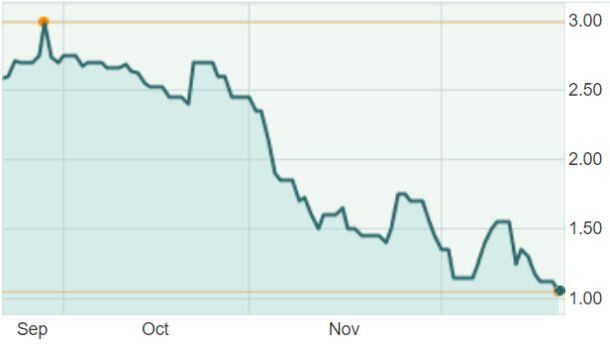Shipments of Soylent bars and v1.6 of its powder (which users add to water to make a drinkable meal) were temporarily halted in October amid reports that “a small number of customers" had "experienced gastrointestinal issues” post consumption.
Three weeks later, Soylent told reporters it would be reformulating both products to remove whole algal flour (supplied by TerraVia) and putting them back on the market asap, prompting headlines including ‘Soylent Says Algae-Based Ingredient Caused Customers to Puke’ and ‘Solved: Algal flour was causing violent illnesses, Soylent says.'
However, TerraVia said Soylent had not had the time to determine which ingredients, or combination of ingredients, were in fact responsible for the digestive issues.
TerraVia CEO ‘surprised and disappointed’
In a statement issued this morning, TerraVia said it was suspending supplies of ALL of its ingredients to Soylent, including its high oleic algal oil, which is a key ingredient in Soylent’s flagship 2.0 ready-to-drink drinkable meal and its new Coffiest coffee-flavored beverage.
The move was “based on the high level of concern that Soylent’s actions in addressing its issues with Powder 1.6 indicate a pattern of behavior that is damaging TerraVia’s business,” said TerraVia, which said its algal flour has been used in more than 20 million servings of products without being shown to have caused any adverse reactions.
It also has a letter of no objection from the FDA in response to its GRAS (generally recognized as safe) determination for the algal flour.
TerraVia: Soylent has not conducted a rigorous investigation of the root causes of the GI problems
It added: “TerraVia has tried to work collaboratively with Soylent to appropriately investigate the cause of the GI issues experienced by a small number of Soylent’s customers.
“To TerraVia’s knowledge, there has not been a rigorous investigation of the root causes of the GI problems before releasing a new version (Powder v.1.7) and to date, Soylent has made no data available that would substantiate its decision to remove algal flour from its products.”
TerraVia CEO Apu Mody said he was “surprised and disappointed” that Soylent had attributed its woes on TerraVia’s ingredient when it lacked compelling evidence to support this assertion.
TerraVia also included a quote from toxicologist George Burdock PhD, president of safety and regulatory consulting firm Burdock Group, in its release, in which Dr Burdock claimed there was “no evidence to indicate a cause-effect relationship for a single ingredient in such a complex mixture.”
'We have to ensure that mis-information isn’t allowed to go unchecked'
Asked why TerraVia had chosen to enter into such a public spat with Soylent, Mark Brooks, SVP of Food Ingredients at TerraVia, told FoodNavigator-USA: "It is critical that we protect the integrity and reputation of our ingredients, many reputable companies are successfully using our ingredients across a wide range of quality food products, on behalf of our customers we have to ensure that mis-information isn’t allowed to go unchecked...
"For us, it’s about protecting the integrity and reputation of our ingredients."


‘There is a cocktail of things in these products that individually or collectively could be responsible for digestive issues’
While whole algal flour is a fairly new ingredient, it already features in several commercial products, but has been removed from the latest version of Soylent's powder on the basis that earlier versions of the powder (without the flour) did not prompt adverse reactions.
However, industry sources pointed out that other changes had also been made to the formulation between versions 1.5 and 1.6 of Soylent's powder, notably the addition of soy protein isolate as the #1 ingredient (replacing brown rice protein), and isomaltooligosaccharide or ‘IMO' a dietary fiber that can cause gas and bloating at high dosage levels.
Version 1.6 also contained higher levels of sucralose and isomaltulose than v1.5.
While IMO and soy protein isolate are also used in the ready-to-drink products (2.0 and Coffiest), which have not apparently generated any digestive problems, the inclusion rates may differ, while other factors such as usage trends (the RTD products are portion-controlled, the powder isn't) and different manufacturing and processing methods could also play a role in the digestive issues experienced, industry sources told FoodNavigator-USA.

There’s a reason why larger companies have two to three year development cycles
One industry source told us last month: “The problem is, there is a cocktail of things in these products that individually or collectively could be responsible for digestive issues, because you’ve got protein, fiber and high intensity sweeteners, and I don’t see how it’s possible in the time that they have had to come to any conclusions about the source of the problem.
“You're talking about products with 40+ ingredients, so it’s very hard to isolate the root cause of the problem unless they do exhaustive studies involving inclusion and exclusion and you can’t do that in a few weeks.
“They’re a fairly new company, there’s a lot of pressure to move fast and all eyes are on them. Food formulation is difficult and expensive and there’s a reason why larger companies have two to three year development cycles, because they don’t want this to happen.”
The combination of many of the ingredients can overwhelm a sensitive gut
Tim Avila, president of Systems Bioscience Inc - a California-based consultancy - told FoodNavigator-USA last month: "Any junior formulator should know that the combination of many of the ingredients can simply overwhelm a sensitive gut. And for those with cast iron GI tracts there are still problems."
He added: "It's not necessarily any single ingredient; you have to look at the combination of ingredients, the dose, and the cumulative effect, because every formulation is a system, and there are a few things in there that are problematic when it comes to osmolality, indigestibility and fermentability.
"And when you've got these things in a dense product like a bar, it compounds the problem, as these ingredients are diverting water into the gut. We're still learning about the digestive effects of some of these new carbohydrates like IMO and if they don't spend enough time testing a new formulation and really understanding what's going on and bring reformulated products to the market too early, they could end up in trouble again."

Soylent begins shipping version 1.7 of its powder
In its most recent blog post dated December 15, Soylent announced it had started shipping a reformulated version of its powder (v1.7), minus the algal flour, but also with a lower level of sucralose, xanthan gum, flavoring and other adjustments. The new, smaller, pack also contains 400 instead of 500 calories.
It did not say when the food bar would be back on the market.
Soylent: TerraVia move will have 'no impact'
However, early this afternoon, it issued a statement saying TerraVia's move would have "no impact" on its business:
"This will have no impact on our business. We have already re-released Powder (v 1.7) without algal flour and halted shipments of Bar until it is reformulated.
"Although our ready to drink line does not contain the ingredients of concern, we have already developed versions without algae out of an abundance of caution. Customers will continue to receive Powder, Drink and Coffiest without delay."
According to its release notes for the beverages, the algal oil was chosen as a replacement for sunflower oil owing to its superior taste and lower environmental footprint.
